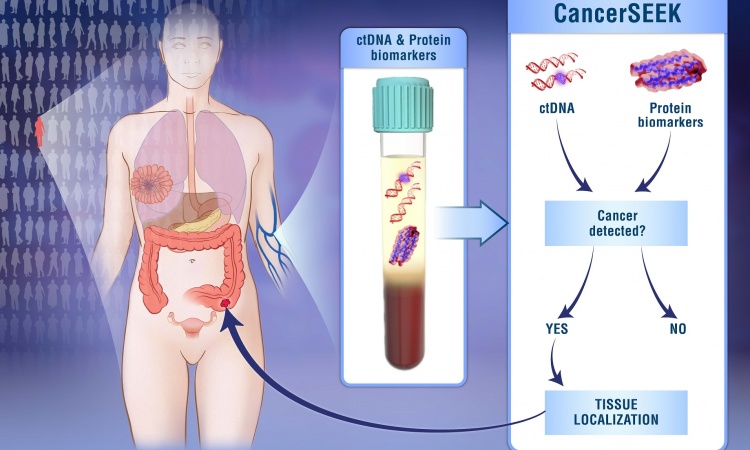Image source: Scientific Animations Inc.
News • Expert prediction
How will Covid affect cancer death rates in 2021?
Researchers have called on European policymakers to make adequate resources available to tackle pancreatic cancer, a disease that is almost invariably fatal and where little progress has been made over the past 40 years.
In the latest predictions for cancer deaths in the EU and UK for 2021, published in the cancer journal Annals of Oncology, researchers led by Carlo La Vecchia (MD), a professor at the University of Milan (Italy), say that pancreatic death rates are predicted to remain approximately stable for men, but continue to rise in women in most EU countries.
The researchers predict that 42,300 and 5,000 men in the EU and UK respectively will die from pancreatic cancer by the end of this year. After adjusting for differences in age distribution in the population, the age standardised rate (ASR) of deaths in men will be eight per 100,000 and 6.5 per 100,000 in the EU and UK respectively this year. This represents a 0.8% decline in death rates since 2015. Among women, six per 100,000 are predicted to die from the disease in the EU, representing a 0.6% increase since 2015. In the UK, five women per 100,000 are predicted to die, representing a 4% decline in the death rate. In contrast, the researchers predict that in nine out of ten of the other major cancers death rates will decline by 7% in men and 5% in women between 2015 and 2021 in most EU countries and the UK.
Prof La Vecchia said: “Among the major cancers, pancreatic cancer is the fourth most common and remains the only one showing no overall fall in death rates over the past three decades in Europe in both sexes. It is important that governments and policymakers provide adequate resources for the prevention, early diagnosis and management of pancreatic cancer in order to improve these trends in the near future. If the cancer is detected early, it is easier to treat successfully, but most cases are advanced by the time of diagnosis. Avoiding smoking and excessive alcohol consumption, controlling weight and, hence, diabetes are the main ways we know to help to prevent the disease, but they only account for a proportion of cases. New, targeted drugs are leading to some improvement in treatment, but it's difficult to quantify their potential impact at present.”
Recommended article

News • Better diagnosis, better treatment
Prostate cancer deaths to decline (almost) everywhere in the EU
Death rates from prostate cancer are predicted to fall in 2020 in the EU, largely due to better diagnosis and treatment, according to new research published in the leading cancer journal Annals of Oncology. In the latest predictions for cancer deaths in the EU for 2020, researchers led by Carlo La Vecchia (MD), Professor at the School of Medicine, University of Milan (Italy), show that since 2015…
The researchers analysed cancer death rates in the EU 27 Member States* as a whole and added the UK in order to be able to compare with previous years when the UK was still a member of the EU. They also looked at the six most populous countries – France, Germany, Italy, Poland, Spain and the UK – for all cancers, and, individually, for stomach, intestines, pancreas, lung, breast, uterus (including cervix), ovary, prostate, bladder and leukaemias for men and women. This is the eleventh consecutive year the researchers have published these predictions. Prof La Vecchia and his colleagues collected data on deaths from the World Health Organization and Eurostat databases from 1970 to 2016. They predict there will be a total of 1,443,000 deaths from the ten cancers in the EU (1,267,000) and the UK (176,000) by the end of the year. This corresponds to age standardised death rates of 130 per 100,000 men (down 7% since 2015) and 81 per 100,000 women (down 5%) in the EU. In the UK, the death rates will be 114 per 100,000 men (down 7.5% since 2015) and 89 per 100,000 women (down 4.5%).
Compared to a peak rate of cancer deaths in 1988, over 4.9 million cancer deaths will be avoided in the EU and over one million deaths avoided in the UK during the 33-year period up to 2021. In 2021 alone, 348,000 and 69,000 cancer deaths will be avoided in the EU and UK respectively.
Changes in smoking patterns, improved food storage and better treatments are driving many of the reductions in death rates for cancers such as lung, stomach and breast. However, although lung cancer death rates are falling in men, they are still rising in women in many countries, reflecting the fact that women tended to start smoking later in the twentieth century than men. In the EU, death rates from lung cancer are estimated to be 32 per 100,000 in men (down 10%), but in women it will be 15 per 100,000 (up 7%). The UK is different, with lung cancer death rates down 11.5% at 24 per 100,00 men and down 5% with a death rate of 19 per 100,000 women.
Trends in mortality from pancreatic cancer and female lung cancer do not show the positive pattern of other major cancers, underlying the need for further efforts for research and control of these neoplasms
Paolo Boffetta
Co-author, Dr Fabio Levi (MD), emeritus professor at the Faculty of Biology and Medicine, University of Lausanne (Switzerland), said: “Lung cancer death rates in men are 25% lower in the UK than in the 27 European countries because of earlier and larger decreases in smoking prevalence in UK men. This is also reflected in the lower predicted death rates for all cancers in UK men. In the EU, men are stopping smoking, though later than in the UK, which explains the predicted fall in male lung cancer death rates in these countries. Lung cancer death rates in UK women are higher than those in the EU countries and this is mirrored in higher female death rates from all cancers in the UK. However, our predictions show a favourable downward trend in UK female lung cancer deaths, in contrast with persistent upward trends in EU women where rates could reach 16 or 18 per 100,000 women in the next decade.”
Co-author, Professor Paolo Boffetta (MD), the Annals of Oncology associate editor for epidemiology. professor and associate director for population sciences at Stony Brook University, New York (USA), and professor at the University of Bologna (Italy), said: “Cancer remains the second major cause of death in Europe after cardiovascular disease. Although we predict that death rates in many cancers will decrease this year, the absolute number of deaths from the disease will continue to rise due to aging populations. This underlines the increasing public health importance of the issue. Delayed cancer diagnosis and treatment due to the Covid-19 pandemic may increase the cancer burden over the next several years. The results we report this year are particularly important because they stress the fact that trends in mortality from pancreatic cancer and female lung cancer do not show the positive pattern of other major cancers, underlying the need for further efforts for research and control of these neoplasms. Measures to continue to improve cancer death rates should include stopping smoking, particularly in women, controlling overweight and alcohol consumption, optimising screening and early diagnosis for breast, bowel and – in central and eastern Europe – cervical cancer too. Up-to-date data management needs to be adopted throughout Europe, particularly in central and eastern Europe, and vaccinations should be widely available for women to eliminate cervical cancer, which is caused by the human papilloma virus, and against hepatitis B, which is linked to liver cancer. Effective treatment of hepatitis C will also contribute to controlling liver cancer.”
Recommended article

Video • For breakthroughs against Hepatitis C
Nobel Prize in Medicine goes to Harvey J. Alter, Michael Houghton and Charles M. Rice
The 2020 Nobel Prize in Medicine is awarded to three scientists who have made a decisive contribution to the fight against blood-borne hepatitis, a major global health problem that causes cirrhosis and liver cancer in people around the world. Harvey J. Alter, Michael Houghton and Charles M. Rice made seminal discoveries that led to the identification of a novel virus, Hepatitis C virus.
In an accompanying editorial, Professor José Martín-Moreno, from the University of Valencia, Spain, and Ms Suszy Lessof, from the European Observatory on Health Systems and Policies, Brussels, Belgium, write that Prof La Vecchia and his colleagues are to be commended for their 11 years of mortality predictions and that “the key to understanding the past and how to approach the future is data”. They believe the analysis gives cause for hope; however, they highlight potential problems from Covid-19 as cancer is a “severe risk factor for Covid-19 infected patients, carrying as it does a higher probability of ICU admission, mechanical ventilation and mortality”.
“The positives [from Prof La Vecchia’s paper] – the concrete evidence that there is scope for effective action which, over time, leads to positive outcomes – should not mask the shadow of the Covid-19 pandemic. Its impact on cancer patients (and the fear of that impact) is looming. Beyond the direct harm of this new coronavirus to immunocompromised and particularly vulnerable people, there is the blow to comprehensive clinical care and the interruption of research. Perhaps most worrying for the long term is the paralysis of prevention programmes, screening and early diagnosis. Since March 2020, all of the activity linked to progress over recent decades has come to a screeching halt. It is, of course, too early to characterize the impacts, but it seems inevitable they will have marked, if not dramatic, consequences,” they write. They conclude: “The possible impact of the Covid-19 pandemic on actual consolidated mortality for 2020, for 2021 and beyond, demands vigilance.”
*At the time of this analysis, the EU had 27 member states, with Croatia joining in 2013 and the UK leaving in 2020. However, Cyprus was excluded from the analysis due to excessive missing data.
Source: European Society for Medical Oncology (ESMO) / Annals of Oncology
22.02.2021







